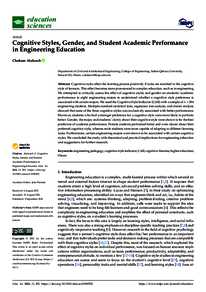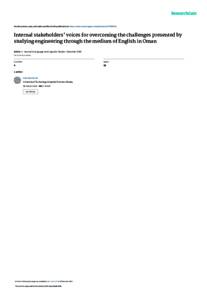Document
Cognitive styles, gender, and student academic performance in engineering education.
Identifier
DOI: 10.3390/educsci11090502
Source
Education Sciences. v. 11, 9, 502
Country
Switzerland
City
Basel
Publisher
MDPI.
Gregorian
2021-09-01
Language
English
English abstract
Cognitive styles affect the learning process positively if tasks are matched to the cognitive style of learners. This effect becomes more pronounced in complex education, such as in engineering. We attempted to critically assess the effect of cognitive styles and gender on students’ academic performance in eight engineering majors to understand whether a cognitive style preference is associated with certain majors. We used the Cognitive Style Indicator (CoSI) with a sample of n = 584 engineering students. Multiple standard statistical tests, regression tree analysis, and cluster analysis showed that none of the three cognitive styles was exclusively associated with better performance. However, students who had a stronger preference for a cognitive style were more likely to perform better. Gender, the major, and students’ clarity about their cognitive style were shown to be the best predictors of academic performance. Female students performed better and were clearer about their preferred cognitive style, whereas male students were more capable of adapting to different learning tasks. Furthermore, certain engineering majors were shown to be associated with certain cognitive styles. We concluded the study with theoretical and practical implications for engineering education and suggestions for further research.
ISSN
2227-7102
Category
Journal articles



